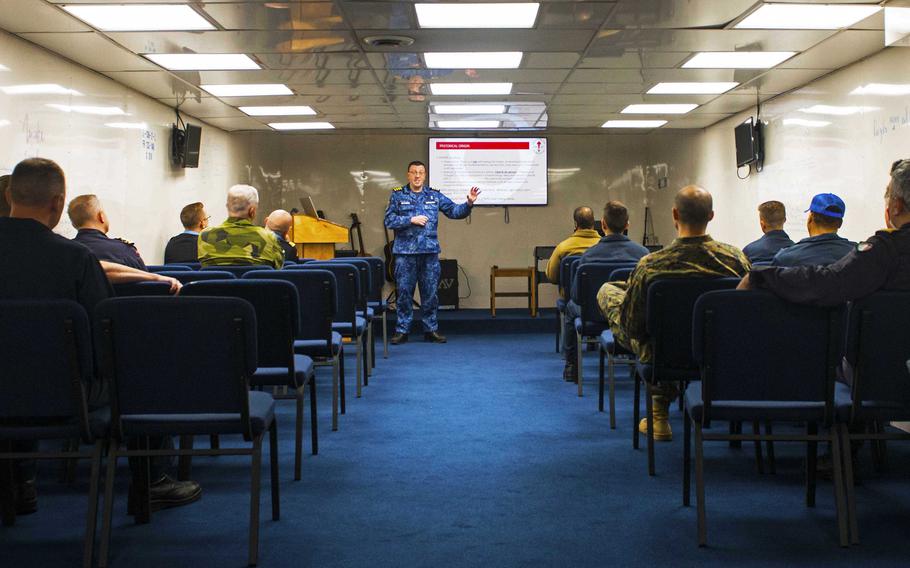
Belgian navy chaplain Emmanuel Reynaerts, a secular humanist, speaks to service members aboard USS Mount Whitney during Baltic Operations 2023. More than a dozen NATO chaplains are taking part in training to support service members during the U.S. Navy-led international exercise in the Baltic Sea. (Mario Coto/U.S. Navy)
TALLINN, Estonia — In times of crisis or combat, a military chaplain can be a grounding force for sailors and Marines, reorienting them to who they are and helping them recognize that they have the training to go on with the mission.
“It’s the sense of reconnecting with their identity, of reconnecting with what they know to be certain, know to be true in the situation,” said U.S. Navy Capt. Brian Weigelt, the chaplain for U.S. Naval Forces Europe-Africa/U.S. 6th Fleet. “A traumatic event often will challenge what we think is true.”
Weigelt and 18 other NATO chaplains participating in the annual U.S.-led maritime exercise BALTOPS, which ends Friday, have been testing that ability to help service members across the alliance. Officials say the effort is recognition that overall readiness requires spiritual strength.
The U.S. Navy increasingly is relying on chaplains as it seeks to address the mental and emotional toll that the work environment takes on its personnel. In 2021, the service announced it would assign a chaplain to every destroyer in the fleet. It has since started deploying more chaplains on ships as part of suicide prevention efforts.
“Steady-state operations at sea are taxing,” Weigelt said. “It’s a grueling life even in the best of times.”
Over the past two weeks, priests, pastors and other religious leaders have met with crew members of other ships and nations to become familiar with their needs. The visits create an opportunity to build the trust required to care for service members in crisis or combat, Weigelt said.
They also offer the training needed so chaplains can ensure sailors and Marines receive the support they need across religious and service affiliations, and language and cultural barriers, the Navy said in a statement Tuesday.
For example, chaplains may be called on to help in a crisis, such as a suicide or man overboard situation. Last year, the training included flying a Belgian chaplain to a British ship in order to tend to sailors during a simulated mass casualty, he said.
Chaplains also planned to gather participants from across the ranks for focus groups designed to start conversations about the trauma associated with the simulated scenarios in the exercise.
Participants will be challenged to think and talk about how they may respond, Weigelt said.
“Realistic training is essential for preparation for what we could possibly be called upon to do,” he said. “So injecting as much realism into the scenario as possible is essential.”
Chaplains also are building connections with commanding officers, who often rely on their emotional and mental support, said Cmdr. Hans Sundsbo, the chief chaplain for the Norwegian navy.
That care includes advising on “religious and spiritual aspects, in ethical issues and in care for the personnel,” Sundsbo said Tuesday.
He has worked with American, German, Finnish, Belgian and Italian chaplains and jointly conducted services on the USS Mount Whitney and a German ship.
“The ability to be a support in times of crises often lies in the integration at steady state,” Sundsbo said. “BALTOPS gives us the ability to practice together and learn from each other’s competence.”